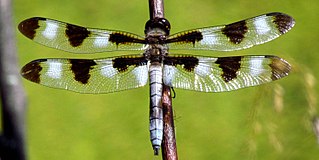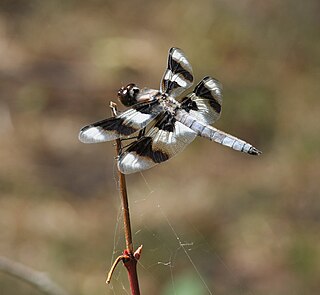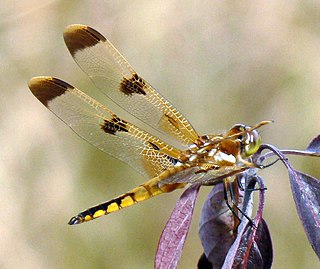
The skimmers or perchers and their relatives form the Libellulidae, the largest dragonfly family in the world. It is sometimes considered to contain the Corduliidae as the subfamily Corduliinae and the Macromiidae as the subfamily Macromiinae. Even if these are excluded, there remains a family of over 1000 species. With nearly worldwide distribution, these are almost certainly the most often seen of all dragonflies.

Oswald Heer, Swiss geologist and naturalist, was born at Niederuzwil in Canton of St. Gallen and died in Lausanne.

Libellula depressa, the broad-bodied chaser or broad-bodied darter, is one of the most common dragonflies in Europe and central Asia. It is very distinctive with a very broad flattened abdomen, four wing patches and, in the male, the abdomen becomes pruinose blue.

Libellula quadrimaculata, known in Europe as the four-spotted chaser and in North America as the four-spotted skimmer, is a dragonfly of the family Libellulidae found widely throughout Europe, Asia, and North America.

The scarce chaser is a species of dragonfly. The adult male has a bright blue abdomen with patches of black, while the adult female and juvenile male each have a bright orange abdomen. It is about 45 mm in length with an average wingspan of 74 mm. It is distributed throughout Europe. This dragonfly is considered a species of special concern in Great Britain due to loss of its specific ideal habitat.

The flame skimmer or firecracker skimmer is a common dragonfly of the family Libellulidae, native to western North America.

Libellula is a genus of dragonflies, commonly called skimmers, in the family Libellulidae, distributed throughout the temperate zone of the Northern Hemisphere. Most species are found in the United States, where they are the best-known large dragonflies, often seen flying over freshwater ponds in summer. Many have showy wing patterns.

The widow skimmer is one of the group of dragonflies known as king skimmers. The nymphs live in the water, molting and growing until they are ready to emerge from the water and then molting a final time to reveal their wings.

The twelve-spotted skimmer is a common North American skimmer dragonfly, found in southern Canada and in all 48 of the contiguous U.S. states.

Libellula angelina, also known as bekko tombo, is a species of dragonfly in the family Libellulidae, native to China and Japan. It is under threat by rapid loss of the ponds and other small water bodies it uses as habitat, and is currently classified as critically endangered by the IUCN.

The neon skimmer is a dragonfly of the skimmer family. It can be found near ponds, lakes and slow moving streams in the southwest United States, Central America, and northern South America.

The eight-spotted skimmer is a dragonfly of the skimmer family.

The great blue skimmer is a dragonfly of the skimmer family. With a total length of 50 to 63 millimetres, it is one of the largest skimmers. The immature forms of the skimmer are brown in color and mature forms are blue-hued. This species is found near lakes, ponds, and slow streams in the eastern United States and rarely in southern Ontario.
Foliata, a Latin word meaning leafy, may refer to:

Neurothemis is a genus of dragonflies in the family Libellulidae. They are found in India, Asia, Australia and the Pacific region. Most Neurothemis species are red in color.

Libellula semifasciata, the painted skimmer, is an uncommon eastern North American skimmer dragonfly, found from New Brunswick, Canada as far south as Texas and Florida.

The blue corporal, also known as little corporal, is a dragonfly in the Libellulidae, or skimmer family. First described as Libellula deplanata by Jules Pierre Rambur in 1842, it is common across much of the eastern United States.

Libellula herculea is a species of Libellula found in Argentina, Bolivia, Brazil, Belize, Colombia, Costa Rica, Ecuador, French Guiana, Guatemala, Guyana, Honduras, Mexico, Nicaragua, Panama, Peru, Paraguay, El Salvador, and Venezuela

















